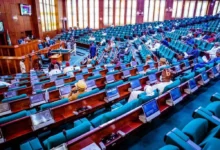
The Abia state governor, Alex Otti, has been warned by the Anglican Church in Nigeria against laying off a large number of public employees.
According to the Church, unemployment and social vices have increased since the state laid off its civil personnel.
The church urged the governor to keep his campaign promises and reconsider layoffs, but made clear that it does not approve of the mass hiring done by the previous administration in the state at the last minute.
It was announced in a communiqué signed by Bishop Christian Ugwuzo of the Aba Diocese in the Anglican Communion and Clerical Synod Secretary Venerable Innocent Ogbonna following the third session of its 17th synod in Aba.
The church urged the state government to improve the lives of its citizens by seeking out economic growth opportunities, such as the construction of modular refineries in the state’s oil-producing regions, the establishment of air and sea ports, the promotion of tourism, and the industrialization of the local area.
The Synod, made up of 12 Bishops, 147 clergymen, and 203 members of the house of laity, all of whom took part in the celebrations of the Diocese’s golden jubilee, voiced their disapproval of the government’s hasty decision to end the petroleum subsidy without taking any steps to mitigate the negative impact it will have on the economy and the people’s daily lives.
The Synod disapproves of “mass layoffs of civil servants within the state,” which “exacerbates the hardship in society and fuels all vices associated with unemployment,” according to the communique.
The Synod does not support the government’s choice to hire thousands of people at the last minute, but it does urge the government to reconsider the policy. The synod is not happy about the government’s decision to end a petroleum subsidy without giving people time to adjust financially and socially.
For the sake of economic growth, job creation, and the general uplift of Abians and other residents, “The Synod urges the present government in Abia State to explore opportunities for development in such areas as building modular refineries in oil-producing areas of the state, establishing air and sea ports, promoting tourism, and local industrialization.”
The church also encouraged the federal and state governments to declare a state of emergency on roads in Aba, saying that the poor condition of most roads in the city has hurt companies, caused hardship, created health dangers, and contributed to a rise in insecurity.
“Given the station of Aba as an outstanding commercial nerve centre in the South East, the protracted dilapidation of most roads in the city strangles business life, increases hardship in the land, stalls development, exposes the citizens to untold health hazards, and scares away industrialists, thus causing unemployment, armed robbery, and all manner of insecurity in the town and its environs,” the report added.
Abia’s road network, including those leading to and from Aba, Port Harcourt, Ohanku, Obohia, and others, is in such disrepair that the Synod has issued an urgent appeal to all levels of government to declare a state of emergency.
The Synod strongly disapproves of the government’s rising pattern of borrowing and its high debt profile, which poses serious economic risks to Nigeria’s current and future generations.
Since “the Synod bemoans the incessant industrial actions in our tertiary Institutions,” “the hike in tuition,” and “the procurement of other academic materials,” including “accommodation,” the Federal government should step in to stabilise the educational sector immediately.
It also decried the rising prevalence of drug misuse and the threat it poses to future generations, and it called on everyone to take part in the fight against drug abuse in all its manifestations.
No matter what happens in the upcoming general election in 2023, the synod is encouraging Nigerians to keep their trust in God and focus their lives on following Christ.















